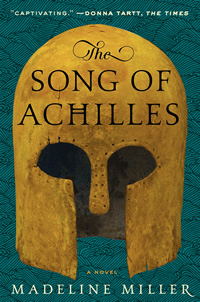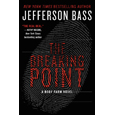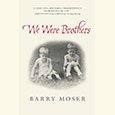Best of the Achaeans
Madeline Miller’s acclaimed debut novel introduces The Iliad’s great hero as a fighter and a lover
Praise for Madeline Miller’s luminous debut novel, The Song of Achilles, reads like a Homeric catalogue of ships: the book, longlisted for this year’s Orange prize, has been praised by virtually every major reviewer at home and abroad: The Wall Street Journal calls it “one of the best novelistic adaptations of Homer in recent memory,” The Boston Globe says it is “powerful, inventive, passionate, and beautifully written”, and The Guardian praises the “in-the-moment brightness of the text.” High accolades for the retelling of a story first sung more than three thousand years ago.
The Song of Achilles aims to uncover the passionate love story hidden inside the greatest war epic in Western literature. The romantic leads are Achilles, the Greek war-hero par excellence, and Patroclus, his tent mate and best friend. Whether the men were actually lovers or simply “boon companions” has been up for debate since Homer first composed his epic saga of the Trojan War. Though The Iliad itself makes no specific mention of a physical relationship between Achilles and Patroclus, even the ancients took sides. Plato thought they were lovers, Xenophon did not, and the debate has—rather pointlessly—continued right up to the present time. Miller treats The Iliad as an epic of love as well as war, and the events of the poem itself provide all the evidence she needs. “For me, Achilles’s extreme and passionate reaction to Patroclus’s death—embracing the body, refusing to bury it, asking for Patroclus’s ashes to be mixed with his own—speak of a connection that is romantic as well as companionable,” she told The Daily Beast.
 “Sing, goddess, of the wrath of Achilles,” begins The Iliad. Actually, in Greek (an inflected language whose syntax is flexible) the very first word of the epic is “wrath”; Miller’s attempt to humanize Achilles is an uphill battle from word one. Homeric heroes were not expected to be morally or emotionally upright; for the Greeks, to be heroic meant simply to be larger than life, to be superhumanly brave (or murderous, or angry, or skilled in rhetoric or battle). They were, like the gods they resembled, irrational and self-interested and often quite cruel. Achilles himself, when offered the choice between a long and peaceful life and a truncated life marked by everlasting fame, easily chooses the latter. To be the best of the Achaeans and obtain apthiton kleos—unwilting glory—is vastly preferable to life on a human scale. Miller’s song of Achilles must therefore be sung in the voice of Patroclus. Seen through the eyes of the devoted man who loved and knew him best, we encounter Achilles (who, in The Iliad, comes off as alternately terrifying and sulky, a killing machine with an ego the size of Olympus) in a much softer light.
“Sing, goddess, of the wrath of Achilles,” begins The Iliad. Actually, in Greek (an inflected language whose syntax is flexible) the very first word of the epic is “wrath”; Miller’s attempt to humanize Achilles is an uphill battle from word one. Homeric heroes were not expected to be morally or emotionally upright; for the Greeks, to be heroic meant simply to be larger than life, to be superhumanly brave (or murderous, or angry, or skilled in rhetoric or battle). They were, like the gods they resembled, irrational and self-interested and often quite cruel. Achilles himself, when offered the choice between a long and peaceful life and a truncated life marked by everlasting fame, easily chooses the latter. To be the best of the Achaeans and obtain apthiton kleos—unwilting glory—is vastly preferable to life on a human scale. Miller’s song of Achilles must therefore be sung in the voice of Patroclus. Seen through the eyes of the devoted man who loved and knew him best, we encounter Achilles (who, in The Iliad, comes off as alternately terrifying and sulky, a killing machine with an ego the size of Olympus) in a much softer light.
A classical scholar who teaches Greek and Latin and who has adapted ancient tales for the Yale School of Drama, Miller has combed ancient texts for different versions of the Achilles legend and constructed an elegant backstory to give the relationship more depth. In her splendidly evoked version of their shared boyhood, Achilles and Patroclus are educated together by the centaur Chiron. Though the difference in their status is always evident (Achilles is half divine, and already marked for glory; Patroclus is a minor princeling who’s also a bit of a nerd), their love for each other transcends status and defies all conventions.
 Most contemporary readers will probably assume the novel’s pervasive sexual anxiety mimics attitudes about homosexuality today. But for the ancient Greeks, sexual models were much different. As Patroclus explains halfway through the book, his relationship with Achilles crosses a line simply because they are too old and too devoted to each other: “[M]any boys took each other for lovers. But such things were given up as they grew older, unless it was with slaves or hired boys. Our men liked conquest; they did not trust a man who was conquered himself.” This is a concise and fair summary of what we know about Greek homosexuality, but it comes a bit late; it would have been nice if Miller had oriented the reader toward a Bronze Age perspective without turning the first half of the book into “Brokeback Mountain sets sail for Troy,” as The Independent called it.
Most contemporary readers will probably assume the novel’s pervasive sexual anxiety mimics attitudes about homosexuality today. But for the ancient Greeks, sexual models were much different. As Patroclus explains halfway through the book, his relationship with Achilles crosses a line simply because they are too old and too devoted to each other: “[M]any boys took each other for lovers. But such things were given up as they grew older, unless it was with slaves or hired boys. Our men liked conquest; they did not trust a man who was conquered himself.” This is a concise and fair summary of what we know about Greek homosexuality, but it comes a bit late; it would have been nice if Miller had oriented the reader toward a Bronze Age perspective without turning the first half of the book into “Brokeback Mountain sets sail for Troy,” as The Independent called it.
But this is a minor complaint. In fact, the love story Miller tells is glorious, and the context in which it plays out is faithful to the original. Gods and goddesses mingle freely with mortals in The Song of Achilles, taking sides, holding grudges, protecting their favorites, and seeking to destroy those they despise, just as they do in The Iliad. Many of the epic’s best scenes are beautifully rehashed—the dreadful sacrifice of Iphegenia on the beach at Aulis is especially brilliantly rendered—and Miller has a knack for making her characters come vividly to life. Wily Odysseus, Homer’s “man of many twists and turns,” steals every scene he’s in.
But Miller’s true gift lies in her ability to flesh out The Iliad’s backstory. Her tale begins long before Homer’s, brilliantly expanding on the horrors of war, and also of the waiting for war, with its long stretches of boredom tempered by moments of happiness and grace. In The Iliad, Briseis is a minor character, a war prize won by Achilles and stolen by Agamemnon, but in Miller’s version, she is a loyal helpmeet to Patroclus, a vibrant reminder of the humanity of the Trojan enemy, and an intelligent and interesting character in her own right. And in the end Miller manages to synthesize all the diametrically opposed notions she has laid out in the novel—the tension between male and female, gods and heroes and humans, war and peace, violence and healing, loyalty and the individual pursuit of glory, and love and sacrifice—into a beautiful whole. Miller, in her graceful, sensitive, and lovely novel, finds a way to grant the doomed lovers a timeless joy that matches the unwilting glory Achilles chose over life itself.
Madeline Miller will discuss The Song of Achilles at Parnassus Books in Nashville on April 17 at 6:30 p.m. Click here for details.


